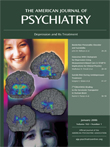Improving Care for Depression in Patients With Comorbid Substance Misuse
Abstract
OBJECTIVE: The authors investigated whether quality improvement programs for depression would be effective among substance misusers and whether there would be a differential program-by-comorbidity effect. METHOD: A group-level randomized controlled trial (Partners in Care) compared two quality improvement programs for depression with usual care. Consecutive patients (N=27,332) from six managed care organizations in five states were screened, and 1,356 were enrolled: 443 received usual care while the rest entered a quality improvement program involving either medication (N=424) or therapy (N=489). Multiple logistic regression was used to test hypotheses and compute standardized predictions of the adjusted rates of depression and use of psychotherapy and antidepressants. RESULTS: Under usual care conditions, depressed patients with substance misuse had an increased probability of ongoing depression despite higher rates of overall appropriate treatment. Among clients with comorbid substance misuse, the quality improvement programs were associated with improved depression outcomes at 12 months and increased antidepressant use at 6 months. Among clients with no substance misuse, the quality improvement programs improved depression outcomes at 6 months and were associated with increased treatment utilization. CONCLUSIONS: Co-occurring substance misuse is associated with depression and with increased risk for poorer depression treatment outcomes under usual care conditions. Quality improvement programs can significantly reduce the likelihood of probable depressive disorders in depressed patients with and without comorbid substance misuse. No consistent evidence was found for a differential program-by-comorbidity effect except for a suggestion of greater increase in psychotherapy among individuals with no substance misuse.



